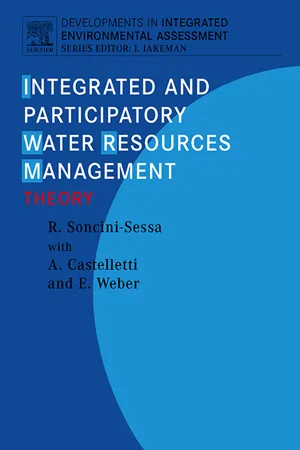
Integrated and Participatory Water Resources Management - Theory
- 582 pages
- English
- ePUB (mobile friendly)
- Available on iOS & Android
Integrated and Participatory Water Resources Management - Theory
About this book
Covering the more recent advances in Modelling, Planning, Management and Negotiations for Integrated Water Resource Management, this text brings together knowledge and concepts from Hydrology, System Analysis, Control Theory, Conflict Resolution, and Decision and Negotiation Theory. Without compromising on mathematical rigour, the book maintains a fine line between theory and application, methodology and tools, avoiding getting locked into excessively theoretical and formal development of the issues discussed. The non-technical aspects of water resource systems (such as societal, political and legal concerns) are recognized throughout the book as having a great, if not fundamental, importance to reaching an agreed-upon decision; they are therefore integrated into the more technical and mathematical issues. The book provides a unified, coordinated and comprehensive framework that will facilitate the increasingly appropriate application of the Integrated Water Resource Management paradigm by current and future practising professionals, decision-makers and scientists.· Integration of technical modelling and control aspects with participatory and decision-making issues· Insightful and comprehensive treatment of theoretical contents, supported by practical examples· A wide collection of exercises and project examples based on real-world case studies (with complete solutions)
Frequently asked questions
- Essential is ideal for learners and professionals who enjoy exploring a wide range of subjects. Access the Essential Library with 800,000+ trusted titles and best-sellers across business, personal growth, and the humanities. Includes unlimited reading time and Standard Read Aloud voice.
- Complete: Perfect for advanced learners and researchers needing full, unrestricted access. Unlock 1.4M+ books across hundreds of subjects, including academic and specialized titles. The Complete Plan also includes advanced features like Premium Read Aloud and Research Assistant.
Please note we cannot support devices running on iOS 13 and Android 7 or earlier. Learn more about using the app.
Information
Table of contents
- Cover image
- Title page
- Table of Contents
- Copyright page
- Introduction
- Chapter 1: Making decisions: a difficult problem
- Chapter 2: From the decision-making procedure to MODSS
- Chapter 3: Actions, criteria and indicators
- Chapter 4: Systems, models and indicators
- Chapter 5: Modelling the components
- Chapter 6: Aggregated models
- Chapter 7: Identifying the optimal alternative
- Chapter 8: Choosing among infinite alternatives
- Chapter 9: Dealing with risk and uncertainty
- Chapter 10: Planning the management
- Chapter 11: The Design Problem with SV policies
- Chapter 12: Off-line non-learning-based policies
- Chapter 13: Off-line learning policies
- Chapter 14: On-line policies
- Chapter 15: Distribution policies
- Chapter 16: The decision-making process
- Chapter 17: Choosing the decision-making method
- Chapter 18: Identifying efficient alternatives
- Chapter 19: Estimating Effects
- Chapter 20: Evaluation
- Chapter 21: Comparison, negotiations and the Final Decision
- Chapter 22: Mitigation and Compensation
- Chapter 23: How to cope with uncertainty: recapitulation
- Chapter 24: Software architecture of MODSSs
- References
- Index